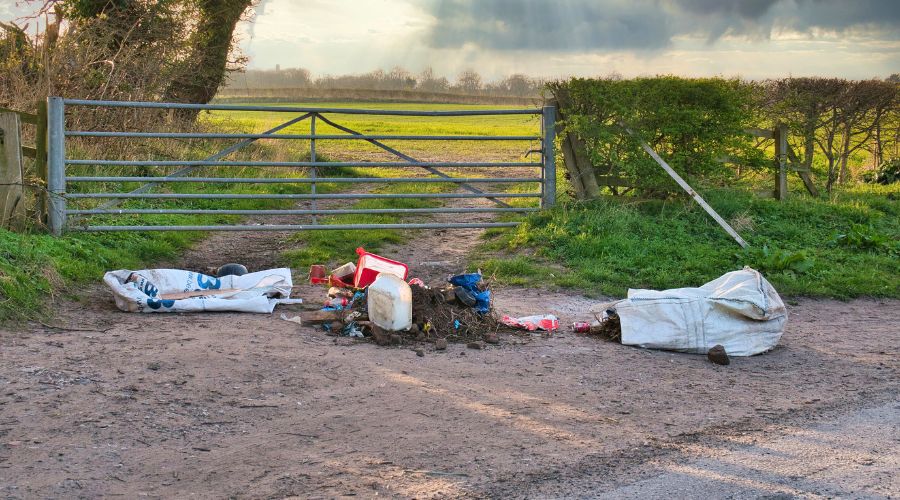Campaigners call for crime strategy as fly-tipping incidents on farms exceed 1 million in a year
28th February 2025
The CLA has challenged the government to launch its rural crime strategy, as new figures reveal how rural communities are being buried under mountains of fly-tipping.

The lateststatistics have revealed that local councils dealt with 1.15 million fly-tipping incidents in 2023/2024. The figures only account for waste illegally dumped on public land that has been reported to the authorities.
Many fly-tipping incidents occur on privately owned land, painting an even more damaging picture of the financial burden and environmental impact fly-tipping brings, CLA said.
The association members found that 90% of respondents had been victims of fly-tipping in the last 12 months, with waste such as tyres, cannabis farm vegetation, nitrous oxide canisters, cooking oil drums, mattresses, fridges and sofas dumped on their land.
Almost 40% had experienced at least six separate incidents in the past year, and more than 75% said fly-tipping has a significant financial impact on their business. More than nine in 10 believe local authorities need increased resourcing to help fight the war on waste.
CLA reminded that nearly 12 months ago, before the general election, Labour pledged to establish a rural crime strategy, but it remains unpublished.
READ MORE: Incident on Jeremy Clarkson’s farm initiates talks about fly-tipping
READ MORE: Cash from perpetrators will help communities beat littering and fly-tipping
‘The government must act’
Country Land and Business Association President Victoria Vyvyan said: “Rural communities have had enough of fly-tipping and waste crime, and the government must act. Farmers and the countryside are increasingly being targeted by organised crime gangs – often violent – who know that rural areas are under-policed and so they target them. The long-promised rural crime strategy needs to be published as soon as possible.
“It’s not just litter blotting the landscape, but tonnes of household and commercial waste, which can often be hazardous – even including asbestos and chemicals – endangering farmers, wildlife, livestock, crops and the environment.
“As Labour itself has pointed out, the crime rate in rural areas has surged by 32 percent since 2011, faster than in urban areas. People, communities and businesses deserve to feel safe and protected, and the first place to start must surely be ending the chronic under-funding of rural police forces.”
Last year the CLA lodged FOI requests that revealed many rural areas in England and Wales have no dedicated rural officers, ringfenced police funding, or forces with basic kit such as torches.
The CLA confirmed that it approached 36 police forces operating in rural areas, and found five have no rural crime team, and eight have less than ten dedicated rural officers. Read the figures here.
READ MORE: Action needed after over 1m fly-tipping incidents reported in England last year
Extra costs for farmers
Colin Rayner, who runs farms in Berkshire, Buckinghamshire and Surrey, said that the family farms have incidents of fly-tipping every day, from a bag of garden waste to lorry loads of waste.
“We have made our farms into medieval forts to try to reduce large loads of waste been tipped on the farms. The cost to the family in terms of extra security, clearing up the waste, and threats from the fly-tipping gangs is too much to bear at times,” he continued.
John Giffard, of the Chillington Estate in Staffordshire, added: “Fly-tipping is a recurring issue across Chillington, creating a significant financial strain on both the estate and the council, as well as wasting valuable time and resources.
“Our frustration is heightened by the lack of action from public bodies, especially when we’ve identified the source of the problem.
“The good news is that the local police force has established new rural policing teams in the county’s most remote areas, and we’re encouraged to see that tackling fly-tipping is now a top priority for them.
“Thanks to the continued support of the Country Land and Business Association, Chillington is now collaborating with public bodies to initiate prosecutions against those responsible.”
David Bliss, CEO of Lowther Estates in Cumbria, said that the farm usually experiences five or six fly-tipping incidents per year, which, aside from being an annoyance, is costly to clear up.
“Ministers should look urgently at increasing the penalties for convicted fly-tippers and properly resource rural police forces to ensure they are held to account. Without more progress, landowners, not the criminals, will continue to pay the price,” he concluded.
Read more rural crime news.
